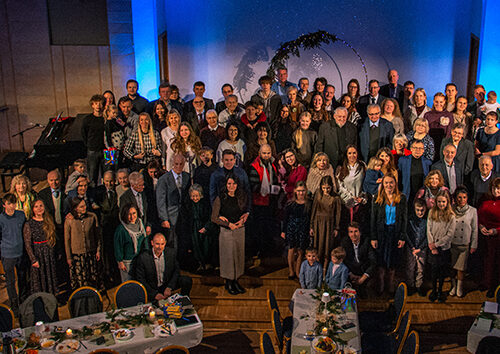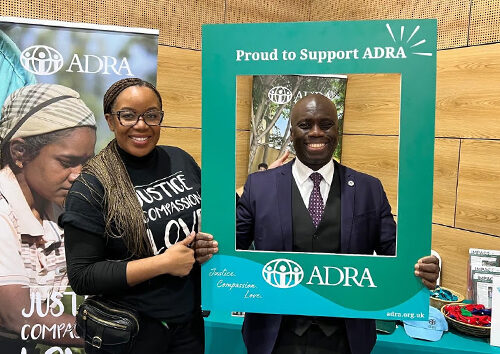August 10, 2017 | Bern, Switzerland [Corrado Cozzi, Taida Rivero] Something very ‘special’ happened at the European Adventist Youth Congress held in Valencia, 1–6 August 2017. For the very first time, and to the great satisfaction of the organisers, an exhibition booth and a workshop was organised highlighting the requirements of people with special needs and disabilities.
 It was a highly dynamic promotion. This allowed the youth to not only receive some information, but above all, to live some ‘special’ moments that would help them understand, to a small degree, what special needs really means. Participants also saw a very active team ‘signing’ for the deaf on the main stage.
It was a highly dynamic promotion. This allowed the youth to not only receive some information, but above all, to live some ‘special’ moments that would help them understand, to a small degree, what special needs really means. Participants also saw a very active team ‘signing’ for the deaf on the main stage.
“Throughout the week, many young people participating in the congress approached our booth,” said Taida Rivero, Spanish Deaf Ministries director and international partner. “They believed that they knew what they were going to find, but they were surprised.” It was not what they expected!
People who cannot walk, are blind or deaf, or are in challenging situations, are quite often considered as living a marginalised life, away from a ‘natural’ context. This comes, mainly from a kind of prejudice that results more from a lack of knowledge then real prejudice.
https://www.youtube.com/watch?v=e16AlJ7ika8
“We looked for ways to help our young participants to break this assumption and ‘live’ an experience that would help change their mind-set,” said Corrado Cozzi, Adventist Inter-European Region (EUD) Deaf Liaison and Special Needs Ministries director.
 The change of ‘thoughts’ came to their lives when young congress participants, who did not suffer from any physical disability, were faced with the real concept of disability. These young, physically able, congress participants changed their attitudes.
The change of ‘thoughts’ came to their lives when young congress participants, who did not suffer from any physical disability, were faced with the real concept of disability. These young, physically able, congress participants changed their attitudes.
“What we did,” said Rivero, “was to provide some playful activities to emphasise the importance of helping friends with disabilities.”
One of the tests that the youth tried was to play “football as if they were blind”.
Imagine two teams, with their eyes covered, playing with a ball that had many little bells inside (to make a noise) and trying to score goals.
It may seem easy from the perspective of a reader, but when tried in reality, it starts to be a little more problematic. Among the difficulties they experienced were enthusiastic spectators screaming encouragement and so masking the sound of the bells, disorientation as to where their opponent is, where there partner is, and even where the goal is, and a feeling of being defenceless.
Although, momentarily, it seemed funny to them, there were also times when we could see, in their faces, the desire to finish the game and finally remove the mask from their eyes.
The darkness, the overwhelming feeling of not knowing where the ball is, or the simple fact of being surrounded by many people who touch you to help orientate you without knowing who they are, these are feelings that no one likes to experience. But many blind people have to deal with this every day. But this was only a small test of a few minutes. It only gave a glimpse of what is a continued, never-ending reality, for many people.
Another activity was to invite youth to sit in a wheelchair and go on a tour guided by a blind person. Of course, they enjoyed it as a game, but most of the youth that experienced this trial admitted that it gave them some understanding of those who are not living it as a game, but as reality for their entire life.
“These emotions were analysed briefly during the workshop entitled ‘Rise and Walk’,” said Cozzi. “As Christians we are called to work and serve all, including defending and assisting those with special needs, supporting their ability to live a life with dignity and respect.”
 In fact, one of the goals of Special Needs Ministries is to help create within all organisations, cultures and people groups a sense of inclusion for people with special needs—an inclusion that provides a sense of ’belonging’ and not simply being included on a membership list.
In fact, one of the goals of Special Needs Ministries is to help create within all organisations, cultures and people groups a sense of inclusion for people with special needs—an inclusion that provides a sense of ’belonging’ and not simply being included on a membership list.
In her lecture, Elsa Cozzi, EUD Children’s Ministries director, presented the issue from the point of view of children and their families.
“Disabilities are a challenge not only for the person directly involved, but also for the family and the community. It is important for a church to be aware of the possibilities and responsibilities we may have: to welcome and support special needs people,” explained Elsa Cozzi.
Disability should not exclude us from finding meaning in our lives, nor should it exclude us from finding the Gospel. They already live with many daily barriers imposed by society. Sharing the gospel cannot become one more barrier for them.
“Disability is a means by which God acts through people who experience His love,” said Rivero. “Disability is nothing more than our inability to understand that we all have different abilities,” she concluded, “and that all need to know the gospel. But to achieve this, we must understand the world of special needs people first, then afterward we can present to them a new kingdom, a new life where all are whole and complete.” [tedNEWS]
tedNEWS Staff: Victor Hulbert, editor; Deana Stojkovic, associate editor
119 St Peter’s Street, St Albans, Herts, AL1 3EY, England
E-mail: [email protected]
Website: www.ted.adventist.org
tedNEWS is an information bulletin issued by the communication department of the Seventh-day Adventist Church in the Trans-European Division.



